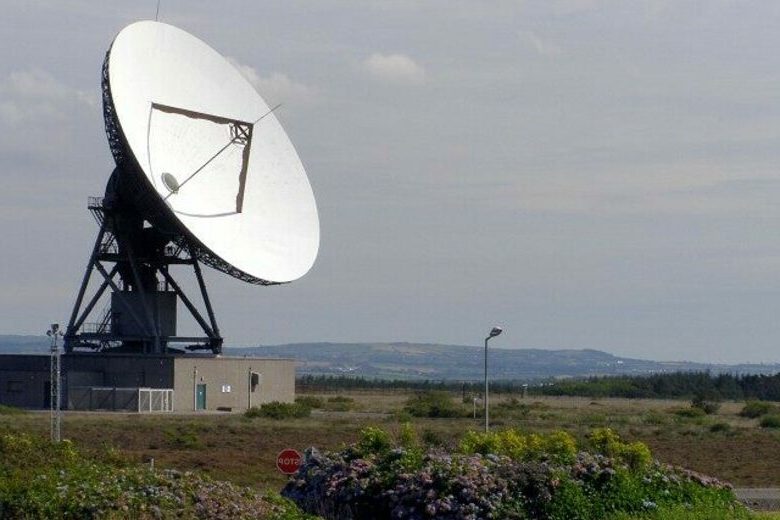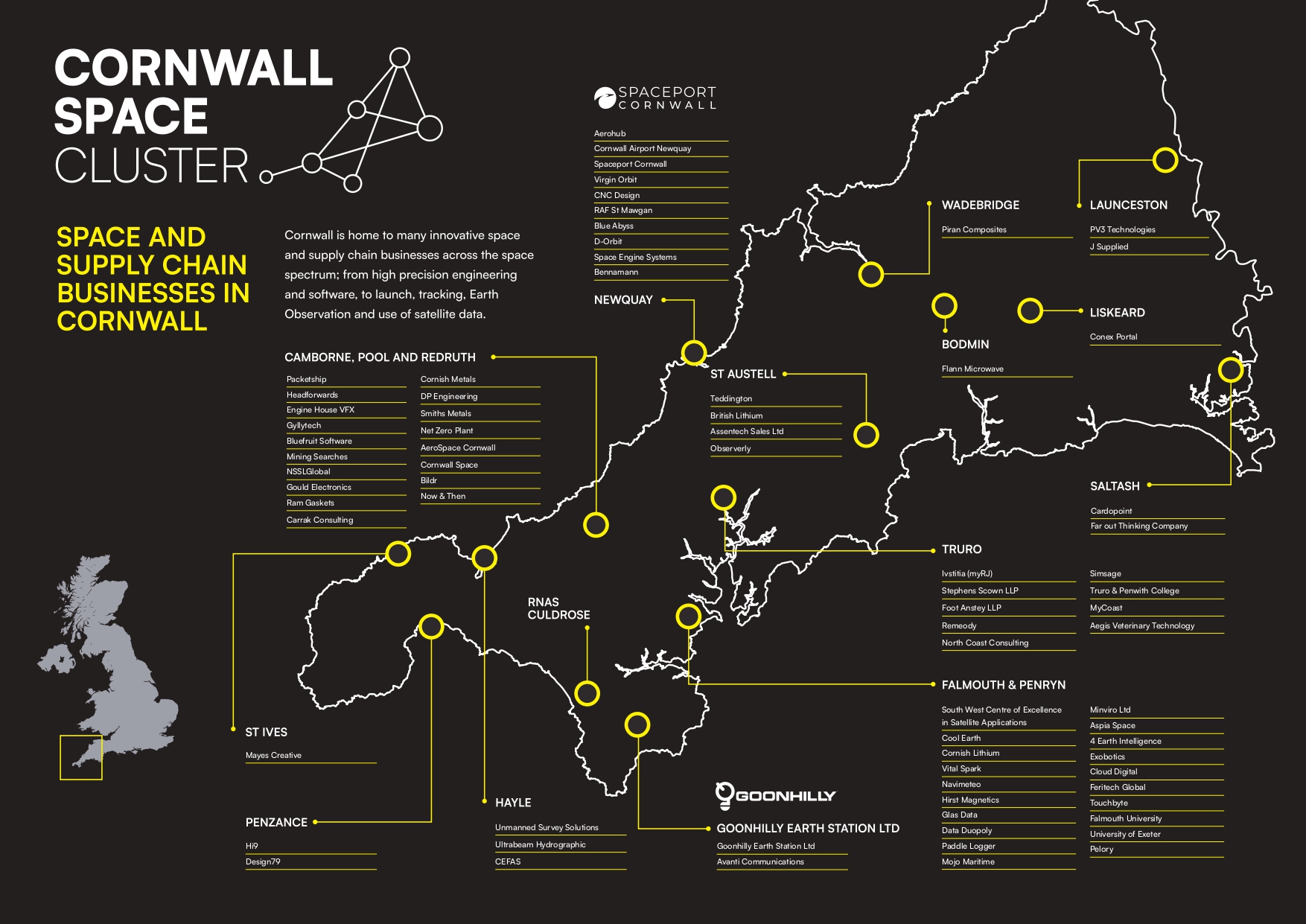The Space Map of Cornwall
19th Dec 2022
The South West of England is home to 11% of all space enterprises in the UK. And within that region, there is one county that stands out as the main hub of activity for NewSpace organisations. The coastal county of Cornwall forms the southwesterly tip of the UK and is the setting for many exciting developments in the space industry.
The NewSpace companies and supply chain firms providing key components that serve the industry collectively form what’s known as the Cornwall Space Cluster.

Source: cornwallspacecluster.co.uk
Cornwall Spaceport
Cornwall is 1 of 7 areas in the UK where Spaceport sites are currently being developed. And it has rightfully grabbed the headlines in recent months as the UK prepares for its first space launch from the facility at Cornwall airport in Newquay. On 16th November, Spaceport Cornwall became the first such port in the UK to gain a space launch permit.
The Spaceport site has been slowly moulded into what we see today with various key changes taking place over the years. The airport’s successful bid to host a dedicated zone for aerospace businesses was accepted by the UK government back in 2011. And a year later, the Aerohub zone was launched.
Within 2 years of its official opening, the European Regional Development Fund, in conjunction with the UK’s Homes and Communities Agency, funded a £6 million business park to attract innovative spaceflight companies to the site. By this point, the Newquay facility was definitely cementing its place as one of the most important areas for the UK space industry as the Brits look to join the new space race.
2018 saw the airport receive official Spaceport status and a further £20 million was pumped into the ongoing project to create a dedicated facility alongside the Aerohub.
Goonhilly Earth Station
Goonhilly Earth Station sits on the Lizard Peninsula in Cornwall. Originally a BT communications centre, the site has since been established as the world’s first private deep-space communications network.
More than 60 communications dishes can be found across the site and collectively they provide satellite connectivity for the UK and beyond. Previously, Goonhilly was used to connect domestic products such as internet, phone calls and TV. But this part of the operation has now moved on to other parts of the UK.
The site was freed up to take on its new role collaborating with the space industry and providing key communication services for the European Space Agency. And as UK space industry activity begins to heat up, Goonhilly is and will be an integral part of its growth.
South West Centre of Excellence in Satellite Applications
NewSpace ventures are heavily reliant on investment. And with many privately owned companies entering the industry with a host of innovative products and big ideas a little coordination is needed.
The National Space Ecosystem is a vision that was set out by former Prime Minister Boris Johnson while he was still in office. The crux of the idea was for the UK to stop simply assisting others in their bids to exploit the business opportunities that space provides and to take charge themselves.
The Satellite Applications Catapult & UK Space Agency have led the way over the last few years to help achieve this bold vision. And in Penryn, Cornwall, The South West Centre of Excellence in Satellite Applications now plays an integral role in the work they do to secure the sustainability and future growth of the industry.
The centre helps to engage businesses by showing them the potential of satellite data and how it can grow their existing enterprise and embrace the future possibilities that this technology brings.
Private space enterprises in Cornwall
Of course, it isn’t only state-funded infrastructure in the Cornwall space landscape. Many other small innovative businesses are based in the area and all contribute to and benefit from the continued expansion of the industry.
Here’s a rundown of some of the other names that are currently operating within the Cornwall Space Cluster.
Virgin Orbit
Virgin Orbit is the self-proclaimed ‘premier dedicated small satellite launch service’. Before Virgin took on the challenge of providing horizontal space launches, this kind of service was simply out of reach for most businesses. Private satellites were the reserve of enormous conglomerates and national governments. But that has now changed with Virgin’s flexible, mobile launch vehicle that is able to make multiple flights every year launching small satellites from anywhere in the world.
Virgin uses its LauncherOne smallsat orbital launch vehicle to carry the payload into orbit, but not via a traditional vertical launch. An adapted Boeing 747-400 passenger plane carries the rocket under its wing to around 35,000 ft before dropping it into a freefall. The rocket’s engines then kick in and send it off onto the required trajectory into orbit.
Aspia Space
Aspia Space provides hyperspectral satellite imagery using cutting Edge AI algorithms to avoid interference from any weather systems.
The rapid delivery of accurate satellite observations is proving integral for many industries. And the ability to utilise AI to predict and create high-resolution images of Earth has put Aspia Space light years ahead of the competition.
D-Orbit
D-Orbit is a leading name in the orbital transport industry. The company is headquartered in Italy but now has a UK branch to add to its list of assets. Back in July 2021, D-Orbit received confirmation of a contract with the European Space Agency to provide transportation and support services. This has helped boost its reputation in the industry and has given the firm a chance to expand its operation further afield.
The UK division of the enterprise is now busy providing integral services to upcoming launches taking place from UK soil. D-Orbit acts as a gateway that connects other Spaceports across Europe and the UK and is working closely with Virgin Orbit and Skyrora to fulfil its aims.
British Lithium
Yet another example of why Cornwall is such an important area in the modern space race era. The county is littered with old mines that were once used to extract tin and copper, among other materials. And thanks to guidance from detailed satellite imagery and the help of the UK Space Agency, British Lithium has discovered a vast supply of the valuable material.
Lithium-ion has been a game-changer for the electric vehicle industry giving greater power that’s packed into a smaller, lighter shell. At present, the UK has to suffer the cost of importing these materials. But now, there is an opportunity to access enough Lithium to sustain the nation’s electric car needs.
The advantages of lithium-ion batteries extend beyond the streets and deep into space as the same benefits are harnessed by a spacecraft and its crew. Batteries are used to power parts of the craft and life support systems for astronauts and are often charged by solar panels while in orbit. The batteries are able to support extensive deep charging cycles over many years. And being small and light also helps to reduce the overall weight and subsequent cost of the launch.







Thank you for your comment! It will be visible on the site after moderation.